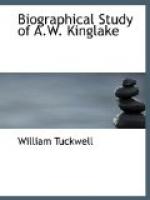gravely remonstrated with the President for inviting
Sir Charles Dilke to his table. Then followed
articles defending the course taken by the President,
and so for some time the ball was kept up. The
remonstrance of the Ambassador was a myth, Lord Lyons
was a friend of Sir Charles; but the latter was suspect
at the time both in England and France; in England
for his speeches and motion on the Civil List; in
France, because, with Frederic Harrison, he had helped
to get some of the French Communists away from France;
and the French Government was watching him with spies.
In Sir Charles’s motion Kinglake took much
interest, refusing to join in the cry against it as
disloyal. Sir Charles, he said, spoke no word
against the Queen; and only brought the matter before
the House because challenged to repeat in Parliament
the statements he had made in the country. As
a matter of policy he thought it mistaken: “Move
in such a matter openly, and party discipline compels
your defeat; bring pressure to bear on a Cabinet, some
of its members are on your side, and you may gain
your point.” Sir Charles’s speech
was calmly argumentative, and to many minds convincing;
it provoked a passionate reply from Gladstone; and
when Mr. Auberon Herbert following declared himself
a Republican, a tumult arose such as in those pre-Milesian
days had rarely been witnessed in the House.
But the wisdom of Kinglake’s counsel is sustained
by the fact that many years afterwards, as a result
of more private discussion, Mr. Gladstone pronounced
his conversion to the two bases of the motion, publicity,
and the giving of the State allowance to the head
of the family rather than, person by person, to the
children and grandchildren of the Sovereign.
Action pointing in this direction was taken in 1889
and 1901 on the advice of Tory ministers.
Amongst Frenchmen of the highest class, intellectually
and socially, he had many valued friends, keeping
his name on the “Cosmopolitan” long after
he had ceased to visit it, since “one never
knows when the distinguished foreigner may come upon
one, and of such the Cosmo is the London Paradise.”
But he used to say that in the other world a good
Frenchman becomes an Englishman, a bad Englishman
becomes a Frenchman. He saw in the typical Gaul
a compound of the tiger and the monkey; noted their
want of individuality, their tendency to go in flocks,
their susceptibility to panic and to ferocity, to
the terror that makes a man kill people, and “the
terror that makes him lie down and beg.”
We remember, too, his dissection of St. Arnaud, as
before all things a type of his nation; “he
impersonated with singular exactness the idea which
our forefathers had in their minds when they spoke
of what they called ‘a Frenchman;’ for
although (by cowing the rich and by filling the poor
with envy), the great French Revolution had thrown
a lasting gloom on the national character, it left
this one man untouched. He was bold, gay, reckless,
vain; but beneath the mere glitter of the surface
there was a great capacity for administrative business,
and a more than common willingness to take away human
life.”




